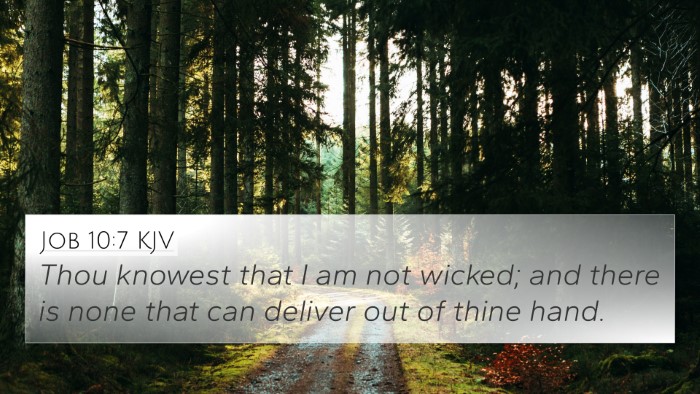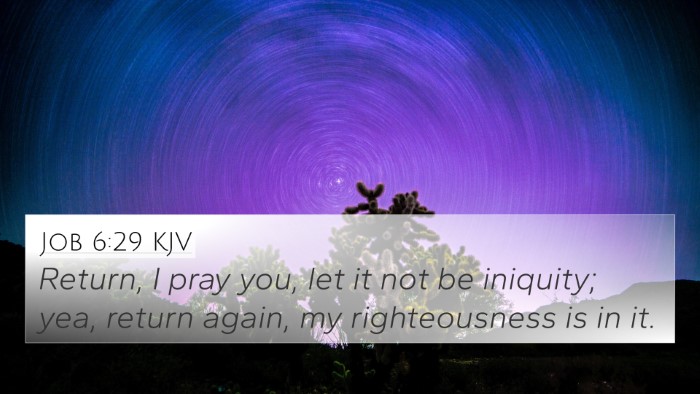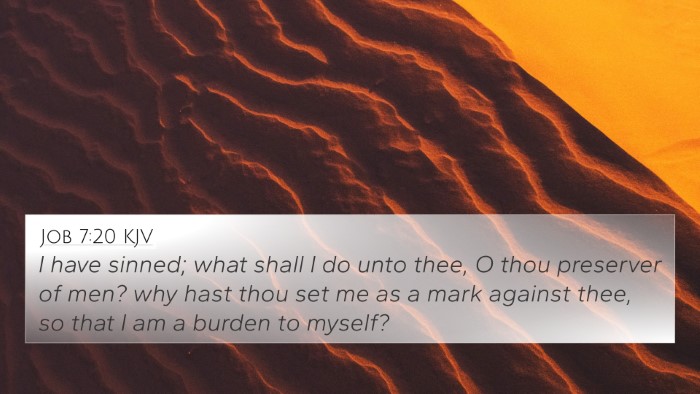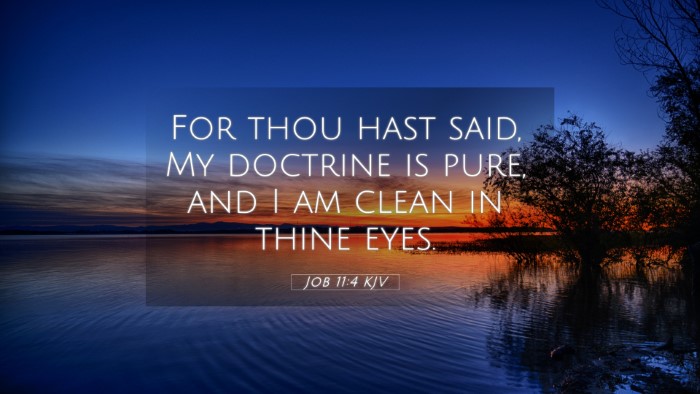Old Testament
Genesis Exodus Leviticus Numbers Deuteronomy Joshua Judges Ruth 1 Samuel 2 Samuel 1 Kings 2 Kings 1 Chronicles 2 Chronicles Ezra Nehemiah Esther Job Psalms Proverbs Ecclesiastes Song of Solomon Isaiah Jeremiah Lamentations Ezekiel Daniel Hosea Joel Amos Obadiah Jonah Micah Nahum Habakkuk Zephaniah Haggai Zechariah MalachiJob 11:4 Similar Verses
Job 11:4 Cross References
For thou hast said, My doctrine is pure, and I am clean in thine eyes.
Uncover the Rich Themes and Topics of This Bible Verse
Listed below are the Bible themes associated with Job 11:4. We invite you to explore each theme to gain deeper insights into the Scriptures.
Job 11:4 Cross Reference Verses
This section features a detailed cross-reference designed to enrich your understanding of the Scriptures. Below, you will find carefully selected verses that echo the themes and teachings related to Job 11:4 KJV. Click on any image to explore detailed analyses of related Bible verses and uncover deeper theological insights.

Job 10:7 (KJV) »
Thou knowest that I am not wicked; and there is none that can deliver out of thine hand.

Job 6:10 (KJV) »
Then should I yet have comfort; yea, I would harden myself in sorrow: let him not spare; for I have not concealed the words of the Holy One.

Job 35:2 (KJV) »
Thinkest thou this to be right, that thou saidst, My righteousness is more than God's?

Job 6:29 (KJV) »
Return, I pray you, let it not be iniquity; yea, return again, my righteousness is in it.

Job 7:20 (KJV) »
I have sinned; what shall I do unto thee, O thou preserver of men? why hast thou set me as a mark against thee, so that I am a burden to myself?

1 Peter 3:15 (KJV) »
But sanctify the Lord God in your hearts: and be ready always to give an answer to every man that asketh you a reason of the hope that is in you with meekness and fear:
Job 11:4 Verse Analysis and Similar Verses
Understanding Job 11:4
The verse Job 11:4 states: "For you have said, ‘My doctrine is pure, and I am clean in your eyes.’" This statement made by Job highlights a pivotal moment in his discourse, where he is confronted by the accusations of his friends, who suggest that he must have sinned to deserve his sufferings. In this commentary, we will explore the meaning of this verse through insights drawn from renowned public domain commentaries by Matthew Henry, Albert Barnes, and Adam Clarke.
Verse Context
To fully grasp the significance of Job 11:4, it's essential to consider its context within the Book of Job. Job, a man of great holiness, is found in dire circumstances, having lost everything. His friends come to console him, but their dialogues turn accusative rather than supportive. Job asserts his innocence, insisting on his piety and righteousness before God. His assertion of purity, contradicted by his friends' claims, forms the crux of this verse.
Commentary Insights
Matthew Henry's Commentary
Matthew Henry emphasizes that Job’s claim of purity and cleanliness serves to illustrate human inclination toward self-justification. Henry points out that Job is blinded by his current state of anguish, assuming that his doctrinal understanding is flawless while accusing God of treating him unjustly. This moment reveals the struggle between self-assessment and divine scrutiny, and it underscores the importance of humility in our relationships with God.
Albert Barnes' Commentary
According to Albert Barnes, the heart of Job's statement lies in his misguided self-righteousness. Barnes explains that Job, in his defense, believes his understanding of God's justice and righteousness should shield him from suffering. However, this reflects a common theological error in assuming that righteousness guarantees a life free from tribulations. This passage, therefore, invites readers to reflect on the complexities of suffering and the mystery of divine justice.
Adam Clarke's Commentary
Adam Clarke interprets Job 11:4 as a representation of the human condition—often we believe ourselves to be just, asserting confidence in our moral standing. Clarke suggests that this is not merely a declaration of Job’s belief in his own innocence but a deeper philosophical inquiry into the nature of God’s justice, and its implications for humanity’s understanding of suffering. The humility required to accept one’s limitations in comprehending divine will is emphasized.
Thematic Connections and Cross-References
Job 11:4 serves as a critical piece within the broader narrative of the Bible. Below are several thematic connections and Bible verse cross-references that augment its meaning:
- Job 1:1 - Highlights Job's initial righteousness and integrity.
- Job 10:7 - Job expresses his longing for God to acknowledge his innocence.
- Psalms 7:8 - A cry for justice that mirrors Job’s plea for divine fairness.
- Proverbs 21:2 - "Every way of a man is right in his own eyes," which reflects human nature echoed in Job's protests.
- Isaiah 53:6 - Discusses the idea of all humans straying, prompting reflection on Job's claim of purity.
- Romans 3:10 - "None is righteous, no, not one," providing a counterpoint to Job's assertion of his own righteousness.
- James 4:6 - Emphasizes humility as a virtue, which ties back to Job's misguided self-confidence.
Conclusion
Job 11:4 is a profound reflection on the human tendency toward self-justification in the face of suffering. As highlighted by the commentary insights from Henry, Barnes, and Clarke, this verse invites believers to consider the complexities of faith, righteousness, and God’s justice. Through cross-references, we see that this theme resonates throughout the Scriptures, emphasizing the necessity of humility and a deep trust in divine wisdom, even when our circumstances seem dire.
Further Study and Reflection
As you delve deeper into understanding Job 11:4 and its implications, consider utilizing tools for Bible cross-referencing to uncover additional connections within the text. Sources like a Bible concordance or a cross-reference Bible study guide can be invaluable in exploring how themes intermingle across both the Old and New Testaments, enhancing your comprehension of Scripture as a cohesive whole.





